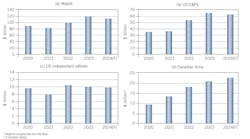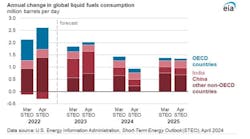Eric Watkins
OGJ Oil Diplomacy Editor
LOS ANGELES, Apr. 6 -- Saudi Arabia’s Minister of Petroleum and Mineral Resources Ali I. Al-Naimi and the United Kingdom’s Energy and Climate Change Sec. Chris Huhne took aim at speculation in oil markets during a meeting in Riyadh.
The official Saudi Press Agency (SPA) reported that cooperation between consuming and exporting countries is important “to stabilize the market, avoid extreme price fluctuations, and decrease the volume of misinformation and exaggerated expectations,” all of which harm petroleum markets.
“Al-Naimi and myself shared common views that there is no shortage of supply and hence there is no reason behind the soaring oil prices, which hover around $115-120/bbl today,” said Huhne following his meeting with Al-Naimi.
Huhne said Al-Naimi is “very committed on providing stability to the oil market.” He said, “To have a very volatile oil market impacts growth. There is a very strong common interest between Saudi Arabia and consumers.”
The meeting between Al-Naimi and Huhne came as Brent crude prices on Apr. 5 fell slightly below a record high of $121/bbl that was reached on Apr. 4—still below the nominal high of $147/bbl in June 2008.
But the 17% fall of sterling against the dollar over the past 2 years has raised the sterling price to £74.60/bbl, which is actually higher than the record set in 2008.
The effects are evident in the UK where wholesale prices have gone up significantly since the start of the year and also since the price rises last autumn, according to an executive at one of Britain’s big six utilities.
“UK wholesale gas prices are up about 25% since January and about 30% since the last round of price rises in November. The trend is pretty clear,” the executive said.
Crude prices have soared above $100/bbl since the beginning of the year as civil unrest has toppled governments across the oil-producing countries of the Middle East and North Africa.
During that time, Saudi Arabia has repeatedly increased production to make up for the loss of supplies from Libya. But those efforts have not been enough to stem the rising price of oil.
Traders are more concerned about the possible loss of supplies from Saudi Arabia itself, which faces a degree of unrest especially from members of the Shi’ite community in the kingdom’s eastern region.
Fears of rocketing oil prices were stoked when former Saudi oil minister Sheikh Yamani told a conference Apr. 5 that serious unrest in his homeland could push oil prices as high as $300/bbl.
“If something happens in Saudi Arabia it will go to $200-300[/bbl]. I don't expect this for the time being, but who would have expected Tunisia?” said Yamani at a conference at the London-based Center for Global Energy Studies (OGJ Online, Apr. 5, 2011).
Even efforts by Saudi Arabia’s King Abdullah, who recently boosted domestic spending, have not been sufficient to allay the concerns of traders. In fact, traders see the King’s efforts as a sign of even greater problems.
King Abdullah announced $93 billion in social handouts in March, the second benefits package to be unveiled within a month, as part of his government's efforts to stave off the kind of unrest that has gripped neighboring Bahrain, Yemen, and Oman.
“The king’s largesse tells you the risk is not nil. It is not 0.1%. The king’s largesse tells you the risk is real—probably around 5%,” a senior executive at one of the world’s largest oil trading houses told the Financial Times earlier this week.
The US government, signaling its own concerns, sent US Sec. of Defense Robert Gates to Saudi Arabia Apr. 6 to discuss unrest sweeping the region with the Saudi king.
"We are going to continue to make sure that our partners understand we're not abandoning them,” said a senior defense official travelling with Gates. "It's important for us to work closely and to share views with our partners in the region, so we're looking for the king's perspective."
Meanwhile, Prince Khaled bin Sultan, Saudi Arabia’s assistant minister of defense and aviation, urged his country’s armed forces to prepare for all eventualities against the backdrop of developments in the region.
“Saudi Arabia is not like other countries,” he said. “It’s home to the two holy mosques and is abundant with natural resources that ensure world economic security.”
Contact Eric Watkins at [email protected].

